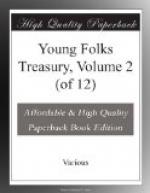Atalanta was a maiden whose face you might truly say was boyish for a girl, yet too girlish for a boy. Her fortune had been told, and it was to this effect: “Atalanta, do not marry; marriage will be your ruin.” Terrified by this oracle, she fled the society of men, and devoted herself to the sports of the chase. To all suitors (for she had many) she imposed a condition which was generally effectual in relieving her of their persecutions, “I will be the prize of him who shall conquer me in the race; but death must be the penalty of all who try and fail.” In spite of this hard condition some would try. Hippomenes was to be judge of the race. “Can it be possible that any will be so rash as to risk so much for a wife?” said he. But when he saw her ravishing beauty as she prepared for the race, he changed his mind, and said, “Pardon me, youths, I knew not the prize you were competing for.” As he surveyed them he wished them all to be beaten, and swelled with envy of anyone that seemed at all likely to win. While such were his thoughts, the virgin darted forward. As she ran she looked more beautiful than ever. The breezes seemed to give wings to her feet; her hair flew over her shoulders, and the gay fringe of her garment fluttered behind her. A ruddy hue tinged the whiteness of her skin, such as a crimson curtain casts on a marble wall. All her competitors were distanced, and were put to death without mercy. Hippomenes, not daunted by this result, fixing his eyes on the virgin, said, “Why boast of beating those laggards? I offer myself for the contest.” Atalanta looked at him with a pitying countenance, and hardly knew whether she would rather conquer him or not. “What god can tempt one so young and handsome to throw himself away? I pity him, not for his beauty (yet he is beautiful), but for his youth. I wish he would give up the race, or if he will be so mad, I hope he may outrun me.” While she hesitates, revolving these thoughts, the spectators grow impatient for the race, and her father prompts her to prepare. Then Hippomenes addressed a prayer to Venus: “Help me, Venus, for you have led me on.” Venus heard and was propitious.
In the garden of her temple, in her own island of Cyprus, is a tree with yellow leaves and yellow branches and golden fruit. Hence she gathered three golden apples, and, unseen by any one else, gave them to Hippomenes, and told him how to use them. The signal is given; each starts from the goal and skims over the sand. So light their tread, you would almost have thought they might run over the river surface or over the waving grain without sinking. The cries of the spectators cheered Hippomenes,—“Now, now, do your best! haste, haste! you gain on her! relax not! one more effort!” It was doubtful whether the youth or the maiden heard these cries with the greater pleasure. But his breath began to fail him, his throat was dry, the goal yet far off. At that moment he threw down one of the golden apples.




